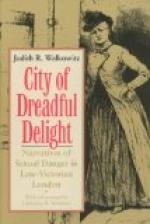John studied her critically. In the last hour the slowly dissolving bond between them seemed to have vanished, wholly, at once.
“O Queen of Kings,” he said, “art thou lonely in this mad place?”
“I have found diversion,” she answered.
“With these new guests?”
“With these new guests. Observe them; there are a pair of lovers among them, mersed in difficulty, hampering themselves, multiplying sorrow and sure to accomplish the same end as if they had proceeded happily.”
“Interested no longer in thine own passion? Alas, my Amaryllis, that love is dead that is interested no longer in itself.”
“O thou bearded warrior, are we then still in the self-centered period of our romance?”
“I fear not; I see the twilight.”
Amaryllis looked down and her face grew more weary.
“You have maintained a long fidelity, John,” she said.
He gazed at her, waiting a further remark, and she went on at last.
“I wonder why?”
He flung out his hands.
“Shall I be faithless to Sheba? Is the charm of the Queen of Kings faded? Shall I turn from Aphrodite or weary of the lips of Astarte?”
“Nothing so stamps your love of me as wicked, in your own eyes, as the paganism you fall into when you speak of it!”
He laughed.
“But it is not that I am lovely which made you a lover—until now,” she went on. “I have seen men faithful to women unlovely as Hecate. It is not that. And I am still as I was, but—”
He looked down on the triple bands of the ampyx that bound her gold-powdered hair and said:
“It is you who have grown weary; not I.”
She astutely drew back from the ground upon which she had entered. It lay in the power of this Gischalan to refuse further protection to her out of sheer spite if she made her disaffection too patent.
“O leader of hosts, canst thou be mummer, languishing poet, pettish woman and spoiled princeling all in one? No! And I shall love the clanking of arms and thy mailed footsteps all the more if thou permittest me to look upon irresponsible folly while thou art absent.”
“Have thy way. I have mine. Furthermore, I wish to thank thee for the companion thou sentest me at breakfast. He who dines alone with her, hath his table full. Farewell.”
Chapter XV
THE IMAGE OF JEALOUSY
The Maccabee resolved that in spite of his heart-hunger, he must not be a frequent visitor to the house of Amaryllis because of the imminent risk of confronting the impostor Julian and the danger of exposure. Not danger to his life, but danger to his freedom to court the beautiful girl, which an unmasking might accomplish. Besides, he had made an extraordinary entry into the Greek’s house in the beginning, and he was not prepared to explain himself even now, if he returned.




